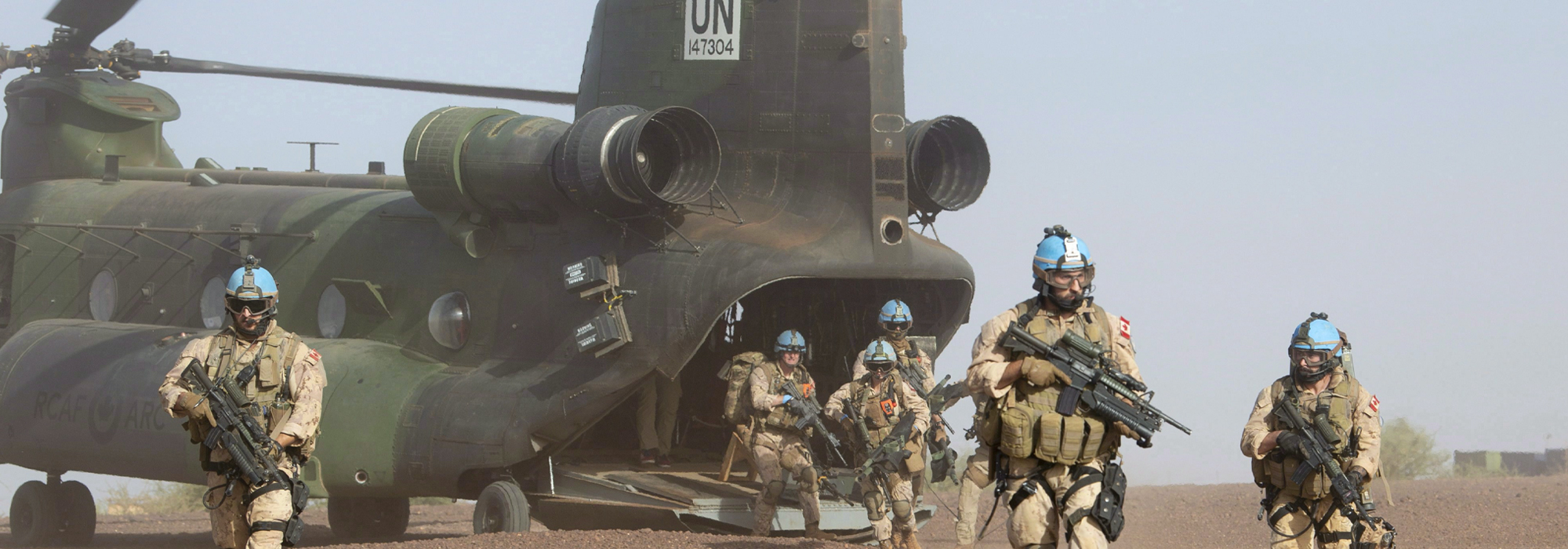
Canada’s recent bid for membership in the United Nations Security Council was promoted with narratives such as “Canada is back” and “The world needs more Canada.” But one of the key failings of this campaign was in the clarity of its messaging: Ottawa did not make it plain to global partners precisely what the country could offer toward steering a more stable, resilient, fair and equitable world. Whether in pursuit of a Security Council seat, or to build a more credible voice on any multilateral platform, careful messaging — the words and narratives that characterize a comprehensive, compelling and visionary posture for Canada on the chess board of international players — is paramount. The articulation and understanding of this messaging is even more complete when it includes some idea of the resources Canada is willing to devote to realizing it. Well-defined positions and corresponding resources can then serve as a policy dashboard for any senior official tasked with projecting Canada’s goals further afield.
The combination of absent messages and relatively small and unpredictable resource commitments will continue to cast doubt on Canada’s intentions as a strong middle power. There is enormous pressure on the country’s national budget in the COVID pandemic; massive debt was incurred to pay for the huge relief package issued to Canadian organizations and citizens; and high levels of investment are required to significantly reduce the country’s carbon count and pivot its economy to cleaner, greener energy sources. With all these demands, a sudden surge of resources to support significant levels of new overseas activity is not assured. But if and when the government can develop and fine-tune a clear and compelling narrative about the country, its national interests and its foreign policy intentions, large resource allocations become less essential.
Developing Canada’s purpose
Messaging concerning Canada’s national interests and foreign policy intentions is important for building predictability. The messaging should reflect national core competencies, strengths and achievements that we are prepared to share with others in the interest of protecting the safety and security of Canadian citizens and the country. But over the past decade or so, Canada’s record has begun to attract global skepticism and cynicism. We pulled out almost completely from Afghanistan in early 2011, our peacekeepers stayed in Mali for only 14 months, military procurement is inefficient and our overseas development aid falls short, year on year. We have reduced our deployable military and humanitarian capacity, withdrawn from serious engagement in the Caribbean and made only lethargic progress, if any, toward our commitment to spend 2 percent of GDP on NATO. Moreover, we seem to lack any well-crafted foreign policies.
In addition to the sense of short-termism and uncertainty that these examples promote, they raise questions about exactly what Canada brings to the table, and why it should be there in the first place. In the middle to longer term, such an indistinct picture of Canada’s intentions undermines its aspirations to influence its stronger G7 partners. In our strained economic times, these partnerships are essential for the rebooting of our economy.
Well-crafted national purposes, articulated through strategic policy reviews or high-level white papers, not only provide credibility for a country’s foreign policy projection but also support enhanced national unity and purpose at home. The UK government’s use of an Integrated Security and Foreign Policy Review to inform the agenda of all security-related functions of government necessitates coordination across the blurred, but important, interface between domestic and international security policy. Canada’s constitution already sets out important principles such as federalism, liberal democracy, constitutionalism, the rule of law and respect for minorities. These principles are much in demand elsewhere in the world, and a lack of them continues to fuel global turbulence and instability. Strong pillars for a clearly understood foreign policy can also be found in our commitments to fair-minded but expansive immigration, a wider free trade zone in the Americas, the reduction of trade barriers between provinces and trading nations and the encouragement of democracy, gender equality and poverty reduction worldwide — practices that could support greater prosperity and economic security elsewhere.
Defining how these important principles are made real, and what Canada will be doing to make it so, will assist in projecting and shaping our national interests. The very able analytical capacity that currently exists across all government offices — including the Canadian Security Intelligence Service, the Department of National Defence, Global Affairs Canada and the Privy Council Office — can be used to assess the ongoing impact of a range of global issues and trends on our national interests. This assessment should then lead to a set of national priorities, which, for a ministry like Global Affairs, would determine how such priorities are projected, promoted and pursued overseas.
Defining interests enables a government to maintain focus on the longer-term intent while working assiduously to implement the most appropriate stepping stones to take us there.
Visionary national priorities should stand the test of time, survive after governments change and be sufficiently resilient to steer planning for a five-to-ten-year period. Although supporting details may change according to the politics of the day, this detail at the working level can and should still support the achievement of broader national priorities. Without defining national interests, and without the foundation with which to assess the impact of analysts’ work, prioritization becomes impossible. But defining interests enables a government to maintain focus on the longer-term intent while working assiduously to implement the most appropriate stepping stones to take us there.
Global relationships that operate at the strategic level must work according to strategic messaging and not the detail. Once embraced, strategic messaging becomes communicated, shared, immediately defaulted to and respected. The result is that, even over a minimal period required for meaningful relationship building, clear messaging enables predictability, memorability and a degree of trust.
An impact abroad
In global regions where it has deployed the right mix of skill sets, irrespective of the size and footprint of the investment backing it, Canada has achieved impact. Our Department of National Defence’s Military Training Assistance Program team managed three-to-five-year engagements in a range of priority countries in eastern Europe, Central Asia, the Caribbean and Africa. Unlike other NATO partners whose budgets for defence diplomacy dwarf the Canadian program, Canada has supported small training teams working in three-year time frames that continue to leave effective and professional institutional capacity on the ground.
In a similar vein, the Afghan government implemented a series of recommendations on administrative and systems reorganization in government departments put forward by Canada’s Strategic Advisory Team, which operated at the cabinet level in Kabul. A further example of focused, helpful and supportive engagement is the Royal Canadian Navy’s training missions involving the deployment of ships and sailors to the coast of Africa. They have left enhanced regional maritime cooperation in the Gulf of Guinea and important capacity for joint maritime interdiction operations by Ghana, Guinea and Liberia.
Similarly, Canada’s more recent engagement in Ukraine, an investment supporting institutional development, military training and strategic advisory capacity has given Canada’s small presence on the ground a meaningful level of influence, as it stands shoulder to shoulder with its British and American allies. Canada serves as a member of the Defence Reform Advisory Board in Ukraine, which has steered and influenced the development of Ukraine’s new national security strategy, its new national security legislation and the management of conflict and ongoing tensions along its eastern border with Russia.
Messaging should show how such interventions project Canadian interests and values in support of a more stable and resilient world.
These examples — all achieved with moderate investment — suggest that, although Canada’s assistance in some areas may come in small packages, its impact can be lasting and remembered. In global regions where Canada is active and where it deploys highly competent skill sets that align to the requirements on the ground, it can make a difference. What is missing from these meaningful and impactful interventions is the messaging that sets the tone for this work at the outset — and the pride and promotion we can give to such work as a result of the relative success we achieve. Messaging should show how such interventions project Canadian interests and values in support of a more stable and resilient world.
With a highly skilled public service, including its diplomatic, humanitarian, military and security institutions, all with overseas mandates, it is worth considering what Canada, a middle power, could achieve through effective planning, partner relationships and targeted assistance programs. Laudable as they may be, Canada’s Elsie Initiative and its Feminist International Assistance Policy will not, on their own, project effectively our desire to help women without a broader narrative, a set of objectives, better programs and effective messaging.
As these objectives become more understood and respected among Canada’s bilateral and multilateral partners, levers of strategic influence — shaped by this narrative — will emerge in the form of both hard and soft power. These levers could include such measures as science diplomacy, gender-responsive governance, crisis management and capacity building for higher education and institutional governance.
The federal government’s response to its citizens in the COVID emergency reminded Canadians of the value that effective public institutions can provide to society. Canada is a trusted, respected and influential global player whose wide-ranging ability and agility has already made a big difference in many parts of the world. In that spirit, we must share our purposes more widely with the hope that our global partners may also develop similar levels of institutional strength and legitimacy. Sharing our purpose by way of a clear national narrative and effective messaging would not only support the development of a more resilient and prosperous world but would also provide Canada with the middle power influence it needs and deserves.
Photo: Canadian infantry and medical personnel disembark a Chinook helicopter as they take part in a medical evacuation demonstration on the United Nations base in Gao, Mali, on December 22, 2018. Canadian peacekeepers in Mali have been pressed into service after extremists with links to Al Qaeda attacked a United Nations base on Sunday, killing 10 and injuring dozens more. THE CANADIAN PRESS/Adrian Wyld











